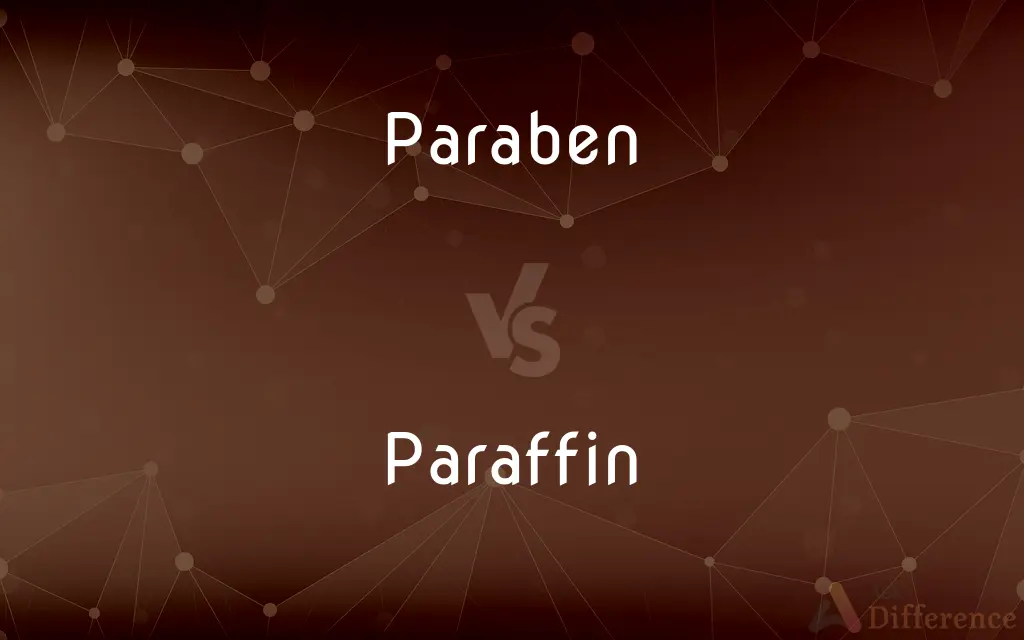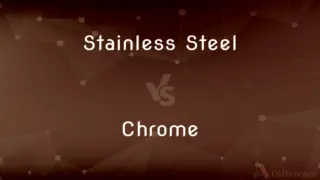Paraben vs. Paraffin — What's the Difference?
By Tayyaba Rehman — Published on December 3, 2023
Parabens are synthetic preservatives in cosmetics. Paraffin is a waxy substance used in candles and cosmetics. Both have distinct roles in personal care products.

Difference Between Paraben and Paraffin
Table of Contents
ADVERTISEMENT
Key Differences
Chemical Composition & Use: Parabens are chemically derived preservatives that extend the shelf life of cosmetics and prevent bacterial growth. On the other hand, Paraffin is a white or colorless soft solid derived from petroleum and used primarily for its moisturizing properties in skin products and as fuel in candles.
Origins & Production: Parabens are synthetic compounds, commonly produced in labs for the cosmetic industry. Paraffin, in contrast, is naturally occurring, typically derived from refining crude oil, and is used in multiple industries, from beauty to energy.
Concerns & Controversies: Parabens have garnered attention for their potential health concerns, especially their purported link to hormone disruption. Paraffin, while generally considered safe, can emit harmful fumes when burned, making certain types unsuitable for candles.
Texture & Properties: While Parabens are mostly added in small amounts and don't alter a product's consistency, Paraffin has a distinct waxy texture. This texture is what makes Paraffin a popular ingredient in creams and lotions, offering a barrier that seals moisture.
Regulation & Alternatives: Due to rising concerns, many products now promote themselves as "paraben-free", opting for natural preservatives instead. Paraffin, being less controversial, remains a staple in moisturizers, but alternatives like soy wax are becoming popular for candles.
ADVERTISEMENT
Comparison Chart
Origin
Synthetic
Naturally derived from petroleum
Primary Use
Preservative in cosmetics
Moisturizer in skin products, fuel in candles
Consistency
Usually liquid or powder
Waxy solid
Health Concerns
Potential hormone disruption
Can emit harmful fumes when burned
Alternatives in Market
Natural preservatives
Soy wax, beeswax
Compare with Definitions
Paraben
A chemical extending the shelf life of beauty products.
This shampoo uses Paraben to prevent bacterial spoilage.
Paraffin
A waxy substance derived from petroleum.
The cream has Paraffin, making it particularly moisturizing.
Paraben
A controversial ingredient in personal care items.
The news highlighted potential health risks of Paraben in deodorants.
Paraffin
A material that can be solid or liquid based on its refinement.
Liquid Paraffin is used in some laxatives, while solid Paraffin finds its way into cosmetics.
Paraben
A compound preventing microbial growth in products.
Paraben content helps to keep makeup fresh for longer.
Paraffin
A product of petroleum refining.
The oil industry produces large amounts of Paraffin.
Paraben
A synthetic preservative in cosmetics.
She checked the label to ensure the lotion was Paraben-free.
Paraffin
A main component in certain candles.
She bought a Paraffin-based candle for its long burn time.
Paraben
A frequently avoided compound in "natural" products.
Many brands now advertise their products as devoid of Paraben.
Paraffin
An emollient in skincare products.
Paraffin is often used in hand creams for its protective barrier.
Paraben
Any of various esters of para-hydroxybenzoic acid that have bactericidal or fungicidal properties and are therefore used as preservatives in cosmetics and pharmaceuticals.
Paraffin
A waxy white or colorless solid hydrocarbon mixture used to make candles, wax paper, lubricants, and sealing materials. Also called paraffin wax.
Paraben
Any of a group of chemicals used as preservatives in cosmetics and pharmaceuticals, wherein the hydrogen of a parahydroxybenzene molecule is replaced by an alkyl group
Paraffin
(Chemistry) A member of the alkane series.
Paraffin
Chiefly British Kerosene.
Paraffin
To saturate, impregnate, or coat with paraffin.
Paraffin
(UK) A petroleum-based thin and colourless fuel oil.
Paraffin
(chemistry) Any member of the alkane hydrocarbons.
Paraffin
Paraffin wax.
Paraffin
To impregnate or treat with paraffin.
Paraffin
To embed in paraffin wax.
Paraffin
A white waxy substance, resembling spermaceti, tasteless and odorless, and obtained from coal tar, wood tar, petroleum, etc., by distillation. It is used in candles, as a sealing agent (such as in canning of preserves), as a waterproofing agent, as an illuminant and as a lubricant. It is very inert, not being acted upon by most of the strong chemical reagents. It was formerly regarded as a definite compound, but is now known to be a complex mixture of several higher hydrocarbons of the methane or marsh-gas series; hence, by extension, any substance, whether solid, liquid, or gaseous, of the same chemical series; thus gasoline, coal gas and kerosene consist largely of paraffins.
Paraffin
From crude petroleum; used for candles and for preservative or waterproof coatings
Paraffin
A non-aromatic saturated hydrocarbon with the general formula CnH(2n+2)
Paraffin
British usage
Common Curiosities
Why is Paraffin commonly found in lotions?
Its waxy texture helps seal in moisture.
Are "paraben-free" products safer?
The debate is ongoing, but many prefer products without Paraben due to potential risks.
Can Paraffin be used in candles?
Yes, but some types can emit harmful fumes when burned.
Are there alternatives to Paraffin in candles?
Yes, like soy wax and beeswax.
Are there health concerns linked to Paraben?
Yes, there are concerns about potential hormone disruption.
Where does Paraffin come from?
It's derived from petroleum.
Why do companies use Paraben in cosmetics?
To extend shelf life and prevent bacterial growth.
What is the primary use of Paraben?
As a preservative in cosmetics.
Is Paraben naturally derived?
No, it's typically synthetic.
Can Paraffin be used in food?
Yes, in limited amounts and specific types, like food-grade Paraffin.
Are Paraben and Paraffin interchangeable?
No, they have different uses and properties.
How can I identify Paraben in product ingredients?
Look for words ending in "-paraben", like methylparaben or propylparaben.
Is Paraffin considered a natural ingredient?
It's naturally derived but goes through refining processes.
Why might someone avoid Paraben?
Due to health concerns or a preference for natural products.
What's the texture of Paraffin?
Waxy solid.
Share Your Discovery

Previous Comparison
Optimized vs. Optimised
Next Comparison
Stainless Steel vs. ChromeAuthor Spotlight
Written by
Tayyaba RehmanTayyaba Rehman is a distinguished writer, currently serving as a primary contributor to askdifference.com. As a researcher in semantics and etymology, Tayyaba's passion for the complexity of languages and their distinctions has found a perfect home on the platform. Tayyaba delves into the intricacies of language, distinguishing between commonly confused words and phrases, thereby providing clarity for readers worldwide.
















































